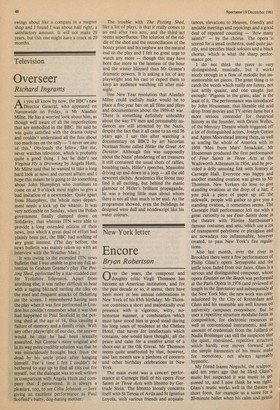Overseer
Richard In grams
As you all know by now, the BBC's new Director General, who appeared on Nationwide on Friday, is Mr Alasdair Milne. He has a worried look about him, as though well aware of all the imperfections that are embodied in the BBC. He said he was quite satisfied with the drama output and couldn't understand all the fuss about too much sex on the telly — 'I never see any of this.' Obviously the fellow, like me, never watches television, which is probably quite a good thing. I bet he didn't see Virginia Fly is Drowning by Angela Huth. Mr Milne said that he wanted to take a long hard look at news and current affairs and I hope this means he is going to do something about John Humphrys who continues to come on at 9 o'clock most nights to give a bad imitation of a newsreader. Quite apart from Humphrys, the \A/hole news department needs a kick up the whatsit. It was very noticeable on Sunday, when the Polish government finally clamped down on Solidarity, that whereas ITN were able to provide a long extended edition of their news, into which a great deal of effort had plainly been put, the BBC had nothing of any great interest. (The day before, the news bulletin was mainly taken up with an interview with the Weather Man.) It was owing to the extended ITN news bulletin that I was unable to give my full attention to Graham Greene's play The Potting Shed, performed by a star-studded cast for Yorkshire Television. Apart from anything else, it was rather difficult to hear with a raging blizzard rattling the tiles on the roof and frequent attacks of flickering on the screen. I remembered having seen the play when it was first performed in London but couldn't remember what it was that had happened to Paul Scofield in the potting shed at the age of 14, thus causing a failure of memory and a family crisis. With any other playwright of our day, the answer would be that he had been sexually assaulted, but Greene's more original and in its way more credible solution was that he was miraculously brought back from the dead by his uncle priest after hanging himself. For a time I felt I couldn't be bothered to stay up to find all this out for myself, but the dialogue was so well written in comparison with Angela Huth and company that I persevered. It is always a pleasure, too, to see Celia Johnson — here giving an excellent performance as Paul Scofield's batty, dog-hating mother.
The trouble with The Potting Shed, like a lot of plays, is that it really comes to an end after two acts, and the third act seems superfluous. The solution of the riddle of the shed and the reconciliation of the boozy priest and his nephew are the natural end to the play and I felt no great urge to watch any more — though this may have been due more to the lateness of the hour and the winter blizzard than Mr Greene's dramatic powers. It is asking a lot of any playwright and his cast to expect them to keep an audience watching till after midnight.
One New Year resolution that Alasdair Milne could usefully make would be to place a five-year ban on all films and plays and documentaries about the 1939-45 war. There is something definitely unhealthy about the way TV men and presumably audiences are still attracted by the Nazis, despite the fact that it all came to an end 36 years ago. I say this after watching a documentary on BBC2 by art historian Norman Stone called Hitler the Great Art Dictator. Although this was supposedly about the Nazis' plundering of art treasures it still contained the usual shots of rallies, bombing raids, Hitler's speeches, Mussolini driving up and down in a jeep — all the old newsreel cliches. Academics like Stone may find it all exciting, but behind the manic glamour of Hitler's brilliant propaganda, he was a boring little man about whom there is not all that much to be said. As the programme showed, even the buildings he designed were dull and nondescript like his water colours.


































































 Previous page
Previous page